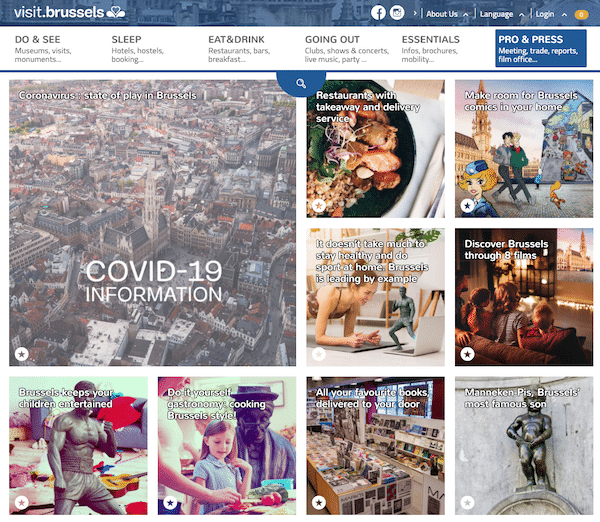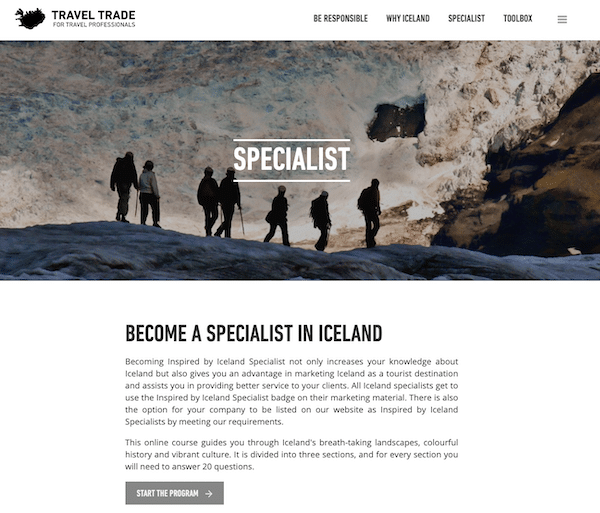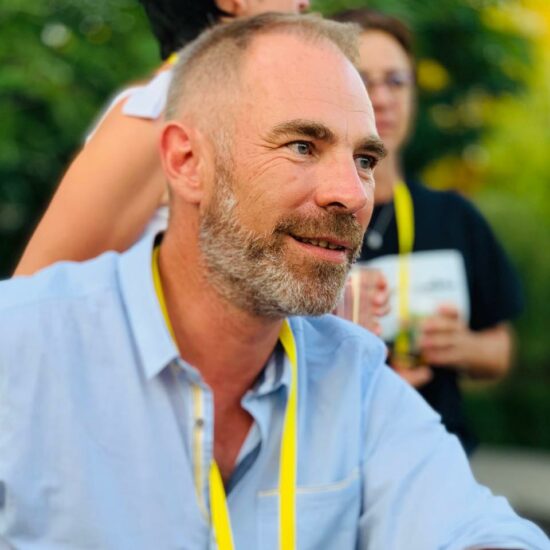Exceptionally, this post has been translated into English to allow interviewees in the language of Shakespeare to read their colleague’s answers.
Click here to access the French version
At the moment, we tend to see news from our neighbours only through cold, grim bar graphs that allow us to compare our misfortunes and the evolution of the spread of the virus according to the policies that have been implemented.
So following the example of Laurence with Japan and Amélie with China, and after Cédric’s enlightening post on the situation of several french DMOs, I proposed to the international speakers we have met in recent years in Pau or elsewhere to answer a few questions.
Many thanks to Sigríður Dögg Guðmundsdóttir, Head of Visit Iceland in Promote Iceland, Patrick Bontinck, CEO of Visit Brussels, and Emmanuelle Legault, Vice-President Marketing and Strategy of Tourisme Montréal for taking the time to answer my request.
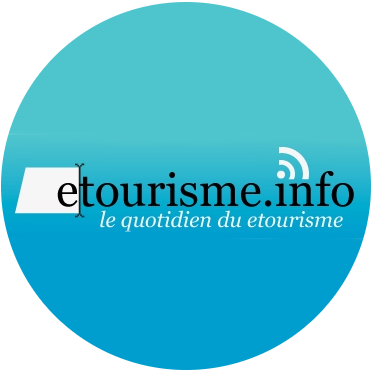 Here, in France, we are starting our third week of confinement in a particular atmosphere, anxiety-provoking for many, too alarmist for some, with polemics and questions about the management of the crisis and questions about what happens afterwards. Can you describe the situation at home? How do you personally experience the situation and what measures have been taken by your government?
Here, in France, we are starting our third week of confinement in a particular atmosphere, anxiety-provoking for many, too alarmist for some, with polemics and questions about the management of the crisis and questions about what happens afterwards. Can you describe the situation at home? How do you personally experience the situation and what measures have been taken by your government?
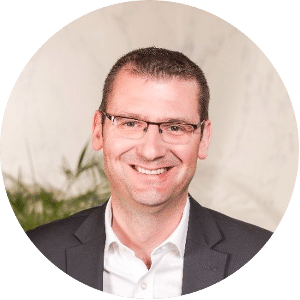 Patrick Bontick, CEO de Visit Brussels
Patrick Bontick, CEO de Visit Brussels
In Belgium the situation is more or less the same as in France. Let’s just say that the containment measures are slightly more flexible compared to those applied in France. The deadline for containment has been set at 18 April but, according to some, this date could be extended to 3 May. From a personal point of view, the situation has above all required a very significant adaptation of our operating methods, and we have now systematized the use of Microsoft’s Teams system. All staff have adapted very quickly to this new method of operation and 80% of the staff telework on a daily basis.
 Sigríður Dögg Guðmundsdóttir, Head of Visit Iceland in Promote Iceland
Sigríður Dögg Guðmundsdóttir, Head of Visit Iceland in Promote Iceland
These times we are living have repeatedly been described as “unprecedented” in the Icelandic media and I think that term captures the sentiment about the situation well. I feel that Icelanders are in general calm and trusting of health officials who are leading the COVID-19 response in Iceland in a successful way. But the economic impact of the pandemic is severe and people are worried about that. The Icelandic government is taking strong measures with the scope of more than 200 billion ISK. That entails actions to counteract unemployment and temporary loss of income, deferral of paid taxes and other levies, expenditure increases, tax cuts, and more. One specific action is funding of a marketing campaign for Iceland as a destination, both on the domestic market as well as on foreign markets.
 Emmanuelle Legault, Vice-President Marketing and Strategy of Tourisme Montréal
Emmanuelle Legault, Vice-President Marketing and Strategy of Tourisme Montréal
As we all find ourselves swept away by the wave that is crashing across the entire planet, the most difficult thing is certainly the lack of control I have over the course of events and the difficulty in assessing what happens next. I won’t hide from you that this is one of the most difficult periods of my career. We have had to make some heartbreaking decisions in order to preserve the organization, but they have had a significant impact on people I deeply appreciate and respect.
Even so, these events have underscored the extent to which we at Tourisme Montréal are a close-knit and brilliant team that demonstrates courage and embodies the creativity we attribute to our wonderful city.
I also believe that one of my greatest challenges is distancing. Personal distancing is one thing, but professional distancing is another. Confinement has left us teleworking, it has reduced our contacts on the phone, wi-fi, Skype or Teams, all of which have their share of challenges! But having to juggle with everyone’s perceptions, listening carefully to the sound of the voice of the other person, reading their silences, feeling the creaking of the Internet connection and moving forward with the inability to read their emotions, their « body language », we quickly become impulsive and often overreact in instinct, in instantaneity. We look for a quick answer and we unpack our thoughts at lightning speed… question of not losing the wifi connection ☺
In this way, we must learn to have empathy, we realize the importance of listening and I mean active listening. During this period of telework, silences must become the norm – giving the other person time to think and respond. I think I’ve always been good at reading people, when I went too far or when I wasn’t relevant. Now, alone in front of my computer, I have to listen to the sound of a voice or detect the grimaces of a face… it’s a whole different challenge.
Politically, our governments have been heavily criticized in the past for their choices and political platforms. Today, we applaud the decisions of our officials at the federal and provincial levels and the programs they are putting in place to support workers and SMEs. We are currently talking about more than $200 billion in direct assistance and tax deferrals, that’s colossal!
Moreover, communication is fluid, daily and transparent. Ideally, we would have unified the message and developed common press briefings to better manage communication and standardize decisions in all jurisdictions. While decisions were made in silos, we may have missed an opportunity to coordinate decisions such as airport closures, for example. But in general, I applaud the excellent work of all levels of government.
 The world of tourism is particularly affected, with the closure of bars, restaurants, places of visit and attractions, and a drastic reduction in travel. DMOs are trying to organize themselves, in particular through online seminars, legal news, online tools for teleworking. How do you organize yourself?
The world of tourism is particularly affected, with the closure of bars, restaurants, places of visit and attractions, and a drastic reduction in travel. DMOs are trying to organize themselves, in particular through online seminars, legal news, online tools for teleworking. How do you organize yourself?
 We have had several phases within the framework of containment, the first was, at the request of the Government, to communicate mainly on hygiene measures and on the fact of having to stay at home. At the same time, we are part of the Government’s Economic Support Task Force and therefore we inform the partners on a daily basis about the economic aid provided to the sector. Many actors also organise live streams or virtual tours of their premises and we support them by broadcasting this programming on our social networks. Next week, we will start phase three, which will consist of showing Brussels at its best in order to remain present in the minds of our potential clients. We have also set up a week-long consultation of all partners to define together a recovery plan as soon as the health conditions will allow us to welcome new customers.
We have had several phases within the framework of containment, the first was, at the request of the Government, to communicate mainly on hygiene measures and on the fact of having to stay at home. At the same time, we are part of the Government’s Economic Support Task Force and therefore we inform the partners on a daily basis about the economic aid provided to the sector. Many actors also organise live streams or virtual tours of their premises and we support them by broadcasting this programming on our social networks. Next week, we will start phase three, which will consist of showing Brussels at its best in order to remain present in the minds of our potential clients. We have also set up a week-long consultation of all partners to define together a recovery plan as soon as the health conditions will allow us to welcome new customers.
 Visit Iceland is focusing on social media sharing, trade relations, PR messaging and information sharing with stakeholders as well as preparing for marketing message when the time is right. We are for example using this time to communicate with travel operators and travel agencies about travel trade tools such as Get to know Iceland webinars and the Iceland Specialist Program.
Visit Iceland is focusing on social media sharing, trade relations, PR messaging and information sharing with stakeholders as well as preparing for marketing message when the time is right. We are for example using this time to communicate with travel operators and travel agencies about travel trade tools such as Get to know Iceland webinars and the Iceland Specialist Program.
 Actually, the team’s doing a great job. They have been working on a newsletter that informs our members and partners on a regular basis on the state of the situation (aid programs; new policies put in place…). They have also started informal meetings with the smaller players. The objective of these exchanges is to exchange, listen and give advice. We really feel that the question that worries us the most is when do we plan to get out of this whole situation, they want a date. Our Members’ Extranet lists all the announcements and new documentation. We also keep a watch on the other destinations that we share with all our members.
Actually, the team’s doing a great job. They have been working on a newsletter that informs our members and partners on a regular basis on the state of the situation (aid programs; new policies put in place…). They have also started informal meetings with the smaller players. The objective of these exchanges is to exchange, listen and give advice. We really feel that the question that worries us the most is when do we plan to get out of this whole situation, they want a date. Our Members’ Extranet lists all the announcements and new documentation. We also keep a watch on the other destinations that we share with all our members.
 In a recent post, we noticed on several destinations observed a logical 80 to 90% drop in the consultation of destination websites. Only webcams were on the rise, probably to observe cities, beaches, deserted ski slopes. What is the situation at home?
In a recent post, we noticed on several destinations observed a logical 80 to 90% drop in the consultation of destination websites. Only webcams were on the rise, probably to observe cities, beaches, deserted ski slopes. What is the situation at home?
 At this stage, we have not noticed such a decrease in the number of visitors to our websites, among other things because we are also mandated to promote Culture among the Brussels public and therefore, even if the number of visitors remains lower than normal, the drop observed is not as significant as the one you mention.
At this stage, we have not noticed such a decrease in the number of visitors to our websites, among other things because we are also mandated to promote Culture among the Brussels public and therefore, even if the number of visitors remains lower than normal, the drop observed is not as significant as the one you mention.
 We have on the contrary seen a rise in traffic to www.visiticeland.com and more people are finishing the Iceland Specialist Program.
We have on the contrary seen a rise in traffic to www.visiticeland.com and more people are finishing the Iceland Specialist Program.
 In our case, in 2019, we have seen dramatic increases. Not only in the number of visits, but also in the rate of engagement. We have put digital back at the heart of all our priorities and we have carried out a series of pilots with the Google’s of this world. If need be, I’ll be able to give you more details, but there’s a lot, as you know, to say to that effect ☺ Our digital ecosystem allows us to be more relevant and optimize our marketing efforts. But since the beginning of the crisis on 9 March, we have seen a 58% drop in all of our target markets, and in France more specifically a 65% drop.
In our case, in 2019, we have seen dramatic increases. Not only in the number of visits, but also in the rate of engagement. We have put digital back at the heart of all our priorities and we have carried out a series of pilots with the Google’s of this world. If need be, I’ll be able to give you more details, but there’s a lot, as you know, to say to that effect ☺ Our digital ecosystem allows us to be more relevant and optimize our marketing efforts. But since the beginning of the crisis on 9 March, we have seen a 58% drop in all of our target markets, and in France more specifically a 65% drop.
 Destinations are asking themselves the question of communication during this crisis? Should we continue to maintain the link on social networks with its communities? What topics should be addressed? Which path have you chosen?
Destinations are asking themselves the question of communication during this crisis? Should we continue to maintain the link on social networks with its communities? What topics should be addressed? Which path have you chosen?
 We started from the premise that it was fundamental to keep in touch with our customers, so we developed a whole series of campaigns on our social networks. Both to inform about hygiene measures, the recommendations of the Government but also, little by little, to start programming images to make people want to come to Brussels when the sanitary conditions allow it.
We started from the premise that it was fundamental to keep in touch with our customers, so we developed a whole series of campaigns on our social networks. Both to inform about hygiene measures, the recommendations of the Government but also, little by little, to start programming images to make people want to come to Brussels when the sanitary conditions allow it.
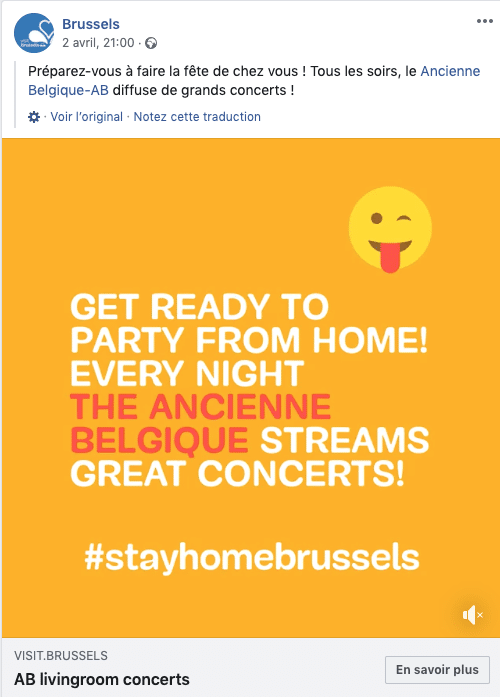
 It is important to keep the communication ongoing during these times. People can´t travel and many are staying at home in quarantine or due to social distancing. Now, destinations have an opportunity to offer people some inspiration and joy instead of direct message about coming to visit. Visit Iceland is using the hashtag #Icelandathome on social media to share stories from Iceland that people are able to enjoy at their own homes.
It is important to keep the communication ongoing during these times. People can´t travel and many are staying at home in quarantine or due to social distancing. Now, destinations have an opportunity to offer people some inspiration and joy instead of direct message about coming to visit. Visit Iceland is using the hashtag #Icelandathome on social media to share stories from Iceland that people are able to enjoy at their own homes.
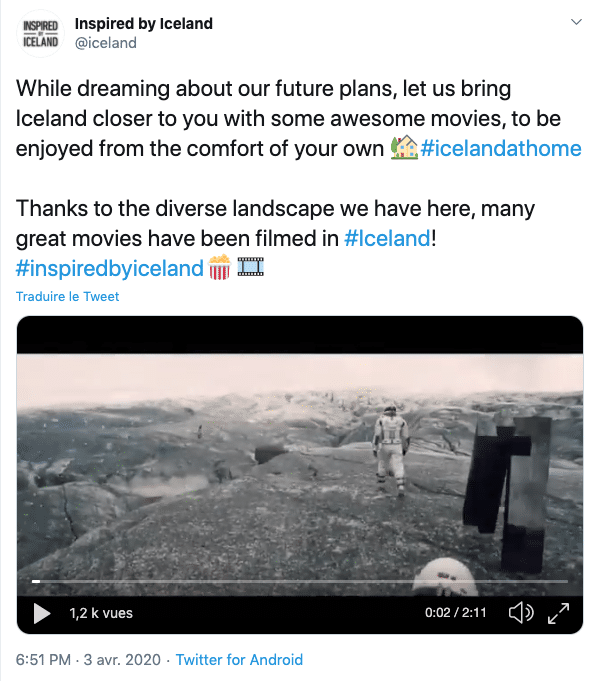
 In the last two weeks of March, we limited publications for two reasons: the population was adapting to the new rules and conditions of isolation, and our staff was transitioning to crisis management mode by working remotely. In addition, there was a lot of noise online as news of the COVID situation evolved. We wanted to avoid adding unnecessarily to this noise until we had a clearer plan.
In the last two weeks of March, we limited publications for two reasons: the population was adapting to the new rules and conditions of isolation, and our staff was transitioning to crisis management mode by working remotely. In addition, there was a lot of noise online as news of the COVID situation evolved. We wanted to avoid adding unnecessarily to this noise until we had a clearer plan.
Then we clearly identified our priorities as follows:
– Update the website to better reflect the current situation.
– Train internal team members on how to publish content on the website.
– Collect and sort content ideas on the theme of things to do at home (virtual experiences, etc.) and create a « what to do » that can be updated on a regular basis.
– Support member restaurants that are still open and offer take-out/delivery service.
– Maintain a positive social media presence.
– Support the communication efforts of other departments.
But all of this, while being careful to continue to contribute to Montreal’s image as a safe and caring city. This image is precious. It will pay off much better to be able to say that we’ve done everything we can to avoid contributing to the epidemic and to be able to welcome more travelers safely over the long term.
That is pretty conclusive. Our content has been shared in Travel and Leisure https://www.travelandleisure.com/trip-ideas/city-vacations/montreal-virtual-tour and our posts are shared by our Mayor Valérie Plante and our Minister Mélanie Joly.
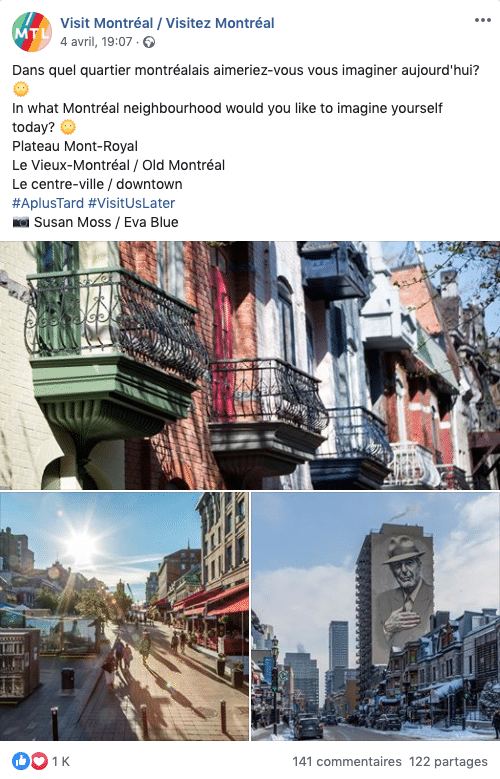

Many destinations are trying to think about the post-crisis period? Calls for citizen tourism consumption are flourishing on social networks, to stay in France this summer, to keep the local economy, our restaurants, bars and hotels running. There is also the risk of a veritable cacophony of communication, all inciting people to come and spend a weekend or a holiday, with the help of promotional films and uncoordinated advertising campaigns. Beyond the fact that the reopening of borders and international airlines are uncertain, how do you personally see the evolution of the clientele and their behaviour in the short and medium term?
 We still find it very difficult today to define what the data for the release from containment will be. Will we be limited to domestic customers only? Will some countries have reopened their borders? What will be the purchasing power of domestic customers? How can we attract to the cities in summer a clientele that will be mainly interested in nature? All these questions we ask ourselves with all the partners of the destination. We explain that we are working on moving targets and that at the moment it is very difficult to say what our targets will be in the coming months. The big challenge of the recovery plan will be to be able to study the different scenarios and to be able to activate them as quickly as possible as soon as the decisions of the States and Governments fall.
We still find it very difficult today to define what the data for the release from containment will be. Will we be limited to domestic customers only? Will some countries have reopened their borders? What will be the purchasing power of domestic customers? How can we attract to the cities in summer a clientele that will be mainly interested in nature? All these questions we ask ourselves with all the partners of the destination. We explain that we are working on moving targets and that at the moment it is very difficult to say what our targets will be in the coming months. The big challenge of the recovery plan will be to be able to study the different scenarios and to be able to activate them as quickly as possible as soon as the decisions of the States and Governments fall.
 It is difficult to predict at this time because of where we are in the stage of the pandemic. As I said before, this is unprecedented and the pandemic and measures to contain it will have big effect on travel behaviour. Closed borders are the most dramatic factor right now but it remains to be seen how the industry will rebound after this period of closures and social distancing. Destinations will pull all efforts into bouncing back, encouraging local travel and with international marketing campaigns to attract foreign visitors. It remains to be seen at which time people want and can travel again. Destinations who will have a good track record of handling the COVID situation might benefit from that.
It is difficult to predict at this time because of where we are in the stage of the pandemic. As I said before, this is unprecedented and the pandemic and measures to contain it will have big effect on travel behaviour. Closed borders are the most dramatic factor right now but it remains to be seen how the industry will rebound after this period of closures and social distancing. Destinations will pull all efforts into bouncing back, encouraging local travel and with international marketing campaigns to attract foreign visitors. It remains to be seen at which time people want and can travel again. Destinations who will have a good track record of handling the COVID situation might benefit from that.
 We are definitely seeing a major paradigm shift. There is an emergence of caring, a return to basic values: empathy; generosity; eco-responsibility, but also the importance of taking time for oneself. I would be surprised if people choose not to take their holidays this summer or fall. People will need to feel alive again. Of course, we will have to consider a decrease in discretionary income in the short term.
We are definitely seeing a major paradigm shift. There is an emergence of caring, a return to basic values: empathy; generosity; eco-responsibility, but also the importance of taking time for oneself. I would be surprised if people choose not to take their holidays this summer or fall. People will need to feel alive again. Of course, we will have to consider a decrease in discretionary income in the short term.
There is also a great deal of solidarity with the local economy. People want to get back on their feet; it’s a return to local pride. And this crisis highlights the importance of consuming locally in all industries.
All the ingredients are there to promote local tourism. In our recovery plan, our priority clientele as we emerge from this crisis will be Montrealers, and then we will open up to local markets within Quebec and then Ontario.
That said, we must be careful not to be protectionist and target only local tourists. To rebuild our local economy and our industry, we need international visitors. Here, as elsewhere, tourist offices cannot simply aim to increase the number of visitors and overnight stays without questioning the positioning and development of the destination, the number and profile of clienteles, the impact of new technologies, in order to ensure tourism and economic development that is compatible with the destination’s assets and in terms of contributing to the quality of life of its citizens.
An international visitor who spends more time in Montréal and wishes to visit the surrounding regions will be preferred to a visitor who jumps from one region to another without ever taking the time to taste its local flavour.
 Numerous voices are being raised, linking the ecological crisis and epidemics, and asking that the means implemented to counter this pandemic can tomorrow be mobilized in favour of the ecological cause? What is the situation in your country?
Numerous voices are being raised, linking the ecological crisis and epidemics, and asking that the means implemented to counter this pandemic can tomorrow be mobilized in favour of the ecological cause? What is the situation in your country?
 Of course, as in any crisis, many voices are raised to seize the opportunity to impose ideas or movements. Some positive, others more worrying. The most important thing now is to manage this crisis, and then we must learn from it. But let’s avoid mixing up the issues, otherwise we risk opening the way for dangerous movements and withdrawal.
Of course, as in any crisis, many voices are raised to seize the opportunity to impose ideas or movements. Some positive, others more worrying. The most important thing now is to manage this crisis, and then we must learn from it. But let’s avoid mixing up the issues, otherwise we risk opening the way for dangerous movements and withdrawal.
 Sustainability and responsible tourism have been at the forefront in all our marketing messages since 2016. We have sought to address the traveller who we can expect to travel in a sustainable and considerate way, is willing to stay longer and to get to know the more authentic side of Iceland and its culture. Iceland as a destination has a lot to offer in favour of the ecological cause.
Sustainability and responsible tourism have been at the forefront in all our marketing messages since 2016. We have sought to address the traveller who we can expect to travel in a sustainable and considerate way, is willing to stay longer and to get to know the more authentic side of Iceland and its culture. Iceland as a destination has a lot to offer in favour of the ecological cause.
 We’re not at the point where we can raise shields yet. People are starting to talk about it, but I must admit that, in Canada, we are still living with the pandemic and talking about the impact on our citizens and businesses. But it is only a matter of time. On the other hand, some nice texts are appearing, such as the one shared by Chantal Lapointe:
We’re not at the point where we can raise shields yet. People are starting to talk about it, but I must admit that, in Canada, we are still living with the pandemic and talking about the impact on our citizens and businesses. But it is only a matter of time. On the other hand, some nice texts are appearing, such as the one shared by Chantal Lapointe:
« We fell asleep in one world, and woke up in another.
Suddenly Disney is out of magic, Paris is no longer romantic, New York doesn’t stand up anymore, the Great Wall is no longer a fortress, and Mecca is empty.
Hugs & kisses suddenly become weapons, and not visiting parents & friends becomes an act of love.
Suddenly you realise that power, beauty & money are worthless, and can’t get you the oxygen you’re fighting for.
The world continues its life and it is beautiful. It only puts humans in cages. I think it’s sending us a message:
« You are not necessary. The air, earth, water and sky without you are fine. When you come back, remember that you are my guests. Not my masters. »

The final word: resolutely optimistic, moderately pessimistic or simply a wait-and-see attitude?
 I’m still very optimistic, it’s in my nature. We are going through the worst crisis we have seen in decades. No one had ever imagined that such a crisis could arise, even a few weeks ago. However, I think that, over the last three weeks, we have seen people show a real capacity to apprehend change in the way they live their daily lives, to invent new ways of working, to rethink local production. As I said earlier, it is still too early to make decisions, but that should not prevent us from thinking individually about how we want to build tomorrow’s world. We have a unique opportunity to redefine the way we live, work and consume and this can be an opportunity to create a better world. Let’s not fall into easy solutions, let’s think together about how we can make this world a more peaceful place for future generations.
I’m still very optimistic, it’s in my nature. We are going through the worst crisis we have seen in decades. No one had ever imagined that such a crisis could arise, even a few weeks ago. However, I think that, over the last three weeks, we have seen people show a real capacity to apprehend change in the way they live their daily lives, to invent new ways of working, to rethink local production. As I said earlier, it is still too early to make decisions, but that should not prevent us from thinking individually about how we want to build tomorrow’s world. We have a unique opportunity to redefine the way we live, work and consume and this can be an opportunity to create a better world. Let’s not fall into easy solutions, let’s think together about how we can make this world a more peaceful place for future generations.
In tourism too we will have to ask ourselves questions but one thing is certain, people will always have the same desire to discover different places, to meet different people and above all to live and discover other cultures and this crisis should not prevent us from doing so. Perhaps these exchanges will be a little less distant. Perhaps we will practice them often. Perhaps we will rediscover that there are exceptional places very close to home where we want to go on a Citybreak.
I remain convinced that people will continue to spend a significant part of their budget on leisure activities and businesses will continue to spend part of their budget on meetings. It is up to us, professionals in the sector, to offer them products that meet their expectations. We will have to surprise them with unique experiences a few miles from home or thousands.
It is the creativity of a united sector that will allow us to get out of this crisis.
 I am generally an optimistic but also realistic. The COVID-19 pandemic is a shock to the whole world and today more than half of mankind are being affected with some form of travel restrictions because of it. Economies around the world are being hit dramatically and it will take time to recover from that. But crisis are also a source of creativity and resilience. I believe that we will come out of this with a stronger collective sense of unity and care for our loved ones and how we use our time. Daily life will again present itself, with both regular daily business and the experiences that add more colour and joy to life. The latter will include travelling, exploring and enjoying life but in a more sustainable and responsible way than before. So even though we need to be prepared for tough times I am optimistic that tourism will get back on its feet sooner rather than later.
I am generally an optimistic but also realistic. The COVID-19 pandemic is a shock to the whole world and today more than half of mankind are being affected with some form of travel restrictions because of it. Economies around the world are being hit dramatically and it will take time to recover from that. But crisis are also a source of creativity and resilience. I believe that we will come out of this with a stronger collective sense of unity and care for our loved ones and how we use our time. Daily life will again present itself, with both regular daily business and the experiences that add more colour and joy to life. The latter will include travelling, exploring and enjoying life but in a more sustainable and responsible way than before. So even though we need to be prepared for tough times I am optimistic that tourism will get back on its feet sooner rather than later.
 Recently a colleague reminded me of a quote from Winston Churchill, « Never let a good crisis go to waste », a great mantra that I chose to adopt. We remain positive because we see the situation as an opportunity to accelerate the transformation of Tourisme Montréal’s role. The organization can and must take on a larger role in order to federate the entire Montréal experience and position the destination. As an industry, let’s come out of this crisis stronger, united with our environment. Let’s work together with our local businesses and promote local tourism that values committed players. So yes, let’s be resolutely optimistic!
Recently a colleague reminded me of a quote from Winston Churchill, « Never let a good crisis go to waste », a great mantra that I chose to adopt. We remain positive because we see the situation as an opportunity to accelerate the transformation of Tourisme Montréal’s role. The organization can and must take on a larger role in order to federate the entire Montréal experience and position the destination. As an industry, let’s come out of this crisis stronger, united with our environment. Let’s work together with our local businesses and promote local tourism that values committed players. So yes, let’s be resolutely optimistic!

